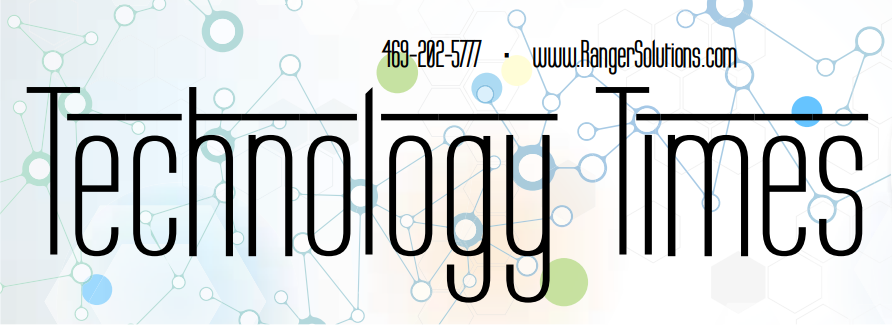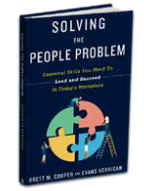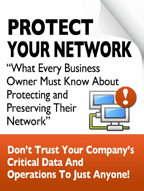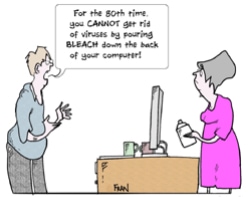
February 2021

Solving The People Problem
By Brett Cooper And Evans Kerrigan
 We all have a “people problem.” It’s that thing that holds us back from truly connecting with our colleagues and teams. Brett Cooper and Evans Kerrigan, authors of Solving The People Problem: Essential Skills You Need To Lead And Succeed In Today’s Workplace, sought to do just as their title suggests.
We all have a “people problem.” It’s that thing that holds us back from truly connecting with our colleagues and teams. Brett Cooper and Evans Kerrigan, authors of Solving The People Problem: Essential Skills You Need To Lead And Succeed In Today’s Workplace, sought to do just as their title suggests.
Solving The People Problem offers strong advice on how to build healthy, professional relationships with the people you work with. The core of this book helps readers develop better communication with those around them. When you understand that everyone communicates in a slightly different way, you put yourself on the path to building stronger teams and increased productivity. If you want to hone your leadership and communication skills, this is a must-read!
How To Enable Remote Work Without Exposing Your Entire Business To Cybercriminals
A record number of businesses said goodbye to the traditional in-office work model in 2020. They embraced the remote work model as they adapted to the new COVID-19 reality. It was a huge shift that came with many challenges, and some of those challenges are still felt today.
One of those challenges was – and is – cyber security. Businesses wanted to get their remote workforce up and running, but there were a lot of questions about how they would keep their newly remote employees secure.
So, how can you enable remote work while keeping your business and your employees secure? How do you keep cybercriminals out? The answer is multifaceted. There is no one-sizefits-all approach to cyber security — that would make things much easier! But there are several steps you can take to help your remote team stay productive while keeping the cybercriminals out. Here are three things you need to do:
1.Skip the public WiFi. This is Cyber Security 101. Never use unsecured, public WiFi, especially when working. For remote employees who have the option to work from anywhere, using public WiFi is tempting. It’s just so easy to access, but it comes with huge risks, including the potential to expose your device to intruders.
Thankfully, there are plenty of options to help keep employees connected without having to worry about snoops. The most popular is the VPN, or virtual private network. VPNs
allow remote workers to securely access the Internet, even through public WiFi. VPNs are ideal for remote workers who need to routinely access your network.
Another option is the personal hotspot. This is a portable WiFi access point, usually paired with data service through a telecom like Verizon, AT&T or T-Mobile. It gives remote workers flexibility to work anywhere they can get highspeed data service. Because the remote worker is the only person on the hotspot (and should be the only person), there is less worry about hackers snooping for your data.
2. Have a strong device policy. When it comes to cost-cutting, it can be appealing to let employees use their own
“There is no one-size-fits-all approach to cyber security — that would make things much easier!”
devices while working remotely. Avoid this, if possible. The bring-your-own-device (BYOD) approach has its benefits, including keeping costs down, but the security costs could be massive, especially if an employee gets hacked or misplaces crucial data. In short, BYOD can get complicated fast, especially for businesses unfamiliar with the BYOD approach.
That said, many businesses work with an IT services company or managed services provider to create a list of approved devices (PCs, laptops, tablets, smartphones, etc.) that employees can use. Then those devices are loaded up with malware protection, a VPN, and other security solutions. So, while employees may be using a variety of devices, they all have the same security and other necessary software in order to perform their duties.
The best device policy, however, is to provide employees with work devices. This ensures that everyone is using the same hardware and software, and this makes it much easier to keep everyone up-to-date and secure. It takes a little more effort logistically, and it has a higher up-front cost, but when it comes to keeping your business secure, it’s worth it.
3. Don’t forget about physical security. While a lot of businesses are focusing on digital security right now, they’re not putting a similar focus on physical security. They may have a team of people working remotely spread across different
neighborhoods, towns, states or countries. This mobility comes with the risk of device theft or loss.
If employees will be carrying their work devices with them for any reason, those devices should be kept nearby at all times. That means never leaving work devices in vehicles or unattended at a café or airport (or any location). Never leave
a device where it has the potential to be taken.
It’s also important to remind employees to not only keep their doors locked but also keep work devices out of sight. You wouldn’t want to set up a home office in a room facing the street outside while leaving the windows open and the door
unlocked, because you never know who may walk or drive by. Just as cybercriminals are always looking for ways to break into your network, criminals are looking for opportunities to walk away with high-value items.
The way we work is changing, so we must be prepared for whatever happens next. Implementing these three steps will give you a starting point, but they aren’t the end point. Work with an experienced MSP to get the most out of your remote
work approach. Many businesses will not be returning to the traditional in-office model, so the more steps we take to secure our businesses and our remote teams, the better off we’ll all be
Free Report: What Every Small-Business Owner Must Know About Protecting And Preserving Their Company’s Critical Data And Computer Systems

This report will outline in plain, nontechnical English the common mistakes that many small-business owners make with their computer networks that cost them thousands in lost sales, productivity and computer repair bills, and will provide an easy, proven way to reduce or completely eliminate the financial expense and frustration caused by these oversights.
Download your FREE copy today at
www.RangerSolutions.com/protect or call our office at 469-202-5777.

SHINY NEW GADGET OF THE MONTH
NexOptic DoubleTake Binoculars
You might not realize, but binocular technology has come a long way in the past 10 years. It’s all thanks to advances in other areas of technology, including high-resolution cameras and high-resolution displays. Bring these technologies together along with some serious image processing, and you are left with NexOptic’s DoubleTake Binoculars!
This pair of binocs is slightly smaller than a good pair of traditional lenses, but it comes with so much more, including a 12-megapixel sensor capable of shooting 4K video. It’s GPS and WiFi enabled and has a Micro SD card port so you can easily save your photos and video. It’s like a supercharged camera, but it has something your average phone camera does not: 10X digital zoom. It’s great for travel or hobbies like birdwatching. Learn more at NexOptic.com/doubletake

4 TRAITS TO KEEP IN MIND WHEN HIRING
1. Value-minded. They’re someone who fits in with your company culture and values. They’re ready and willing to learn and grow within that culture.
2. Purpose-driven. They aren’t in it just to collect a paycheck. Yes, being paid is important, but there must be drive beyond that. They have their purpose and they’re working toward it.
3. Standout. There’s something about them that strikes you — it could be anything from their credentials to their personality, but it’s something that sticks with you in a positive way. They go the extra mile.
4. Open-minded. They’re receptive to feedback and criticism and use it to grow. But more than that, they’re willing to give feedback to others. They’re comfortable with honesty. Forbes, Nov. 23, 2020
These Passwords Could Get You Into Trouble
In 2020, people were caught using the same passwords they’ve used for years. These are passwords that hackers and cybercriminals don’t have to work to get. According to NordPass, a password manager, the worst, most common passwords of 2021 included:
5. 12345678
4. password
3. picture1
2. 123456789
1. 123456
These are passwords you never want to use. That goes double for any accounts that contain access to personal or financial information. People rely on simple passwords because they are easy to remember, but if it’s easy to remember, it’s not
really a password at all!
Communication In Times Of Fatigue
In light of all the Zoom and videoconferencing meetings, communication is changing both internally and externally
Some companies think working remotely is the best thing they’ve ever done, while others say it’s awful because they thrive on personal, face-to-face relationships.
Oftentimes, dominant personalities can overrun the room in person, but on a video call, the indirectness of virtual communication can help more soft-spoken team members feel comfortable speaking up.
When companies are together in person, they grab a coffee and a meeting breaks out, but when you have that on video it’s awkward. There has to be more structure to the meetings because people don’t want to spend an excessive amount of time like they would in person. They want to make it as short and efficient as possible.
Where people could get better is in their external messages on video chats. When you speak to your team, use a different tone. Simple things like charisma, lighting and talking to your audience – the things people master for TV and film – take a lot more effort than chatting with your team in person. Not having this skill is hurting some on the marketing side.
In planning for 2021, companies are running into big issues and plans may need to change.
It’s time for the annual reset and the One-Page Strategic Plan (OPSP) – the gift that gives back for the next four quarters. We set our annual key initiatives – six to eight things over the next 12 months to move the business forward – but what often gets left behind is time to reset ourselves.
We need to be mindful of what we’re doing with our people to keep them on track on a personal-growth level. We’re all a little out of our rhythm right now, but so goes the person, so goes the business. We need to develop the whole person to get the best results in the new year.
Answer the question: what do you want? Don’t let your logic stifle what your true goals are. Once you define it, then you can set out and figure out how to achieve it.
With upcoming changes, necessary planning and so much more, how can organizations combat the fatigue?
We must make time to take a break and step away for a moment. Set some boundaries.
It’s easy for us right now to just keep working – especially working from home. You have to make yourself “go home.” Do simple things, like changing your clothes after work, to turn the “work” switch off. Make yourself “commute” home. At 5 p.m., go to the store and drive back home. Give your body and mind the shift change. Honor a schedule because it is easy not to
Chip Gallent’s career has taken him through a number of C-level roles with a nonprofit, a technology development company, a publicly traded dot-com firm where he served as president and more! With an extensive background in marketing, and
as a fervent entrepreneur, he’s led many businesses to success. Now, as a Petra Coach, he’s helping others do the same.
Driving Business Success In The Age Of COVID-19

Countless businesses had to figure out how to navigate the last year. Some didn’t make it, but at the same time, many thrived. Nearly a year after the pandemic began, many businesses are still trying to navigate COVID-19 repercussions. How do you drive success in 2021?
Budget Wisely. Countless businesses had a knee-jerk reaction to the pandemic. They rapidly cut costs in an effort to survive. Cutting certain areas can work. But cut the wrong area of a business, and it may be hard to recover. Some
companies that put off upgrading technology during the pandemic are now paying for this costly mistake. Out-of-date hardware and software with out-of-date hardware and software have created holes in their networks, making them open to cybercriminals. However, if your customers didn’t stick around, cutting the marketing budget is disastrous.
Embrace New Ideas. COVID-19 isn’t going anywhere soon. Businesses that decided not to adapt because they thought it would blow over or it wasn’t serious were put into a tough spot. Meanwhile, businesses that planned and focused on innovation were in a much better spot. When your customers’ habits change, your habits need to change as well. Forbes, Nov. 23, 2020
THE REALITIES OF BURNOUT
We all feel burned out every now and again. It’s the point when we feel completely exhausted with our work and need to step away. But here’s a different way to think about burnout: we don’t get burned out because we’re working too much, we
get burned out because we’re doing too little of what we love.
When we do things that we’re passionate about, that gives us energy and keeps us going. When our work becomes work for the sake of work, that’s what drives us toward exhaustion. You may be productive, but does your productivity enrich your
life in any meaningful way? To truly avoid burnout, engage in activities, projects and tasks that drive you forward and keep the passion alive. Inc., Nov. 23, 2020



